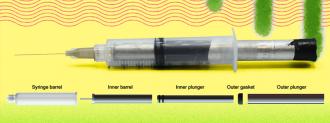The latest healthcare breakthrough out of MIT isn’t a new medication or treatment. It’s a reimagining of the humble syringe that could dramatically increase access to a powerful class of drugs.
Known as “biologics,” these drugs are derived from living cells — botox and human insulin are two examples — and they have a host of advantages over their synthetic counterparts.
“(Biologics) enable a degree of personalization, specificity, and immune response that just isn’t available with small-molecule drugs,” researcher Vishnu Jayaprakash told MIT News. “That’s why, globally, people are pushing toward biologic drugs.”
The Biologics Bottleneck
Today, doctors use biologics to treat a range of health problems, from diabetes to various cancers, but administering the drugs is complicated.
Many biologics are highly viscous, meaning their consistency is sticky and thick, like honey. Because of this, more than 100 known biologics are impossible to inject with a standard syringe.
There are a few alternatives, but none is ideal, particularly when considering how to treat people in developing nations or rural areas.
Doctors can dilute the drugs and deliver them via an IV, but that’s only viable for patients who have access to a hospital or clinic (and time to kill). Auto-injectors like the Epi-Pen are currently too expensive for widespread use. Jet injectors are also costly, and they’re prone to contamination.
“Where drug delivery and biologics are going, injectability is becoming a big bottleneck, preventing formulations that could treat diseases more easily,” researcher Kripa Varanasi said.
A Better Syringe
To address this problem, MIT researchers developed a new low-cost syringe that makes it possible to inject viscous biologics without diluting them.
Rather than containing one barrel, like a standard syringe, MIT’s contains two, one inside the other.
The biologic goes in the interior barrel and a thin lubricant goes in the other. When the syringe’s plunger is depressed, the lubricant coats the biologic, helping it exit the needle with less resistance.
According to the study, published in the journal Advanced Healthcare Materials, the syringe reduced the amount of force needed to inject even the most viscous drug tested by 85%.
Now, all 100 of the biologics that were previously too viscous for delivery via syringe can be injected, opening up their use in places where other delivery options aren’t feasible.
“There should be no reason why this approach, given its simplicity, can’t help solve what we’ve heard from industry is an emerging problem,” Varanasi said. “The foundational work is done. Now it’s just applying it to different formulations.”
We’d love to hear from you! If you have a comment about this article or if you have a tip for a future Freethink story, please email us at [email protected].






